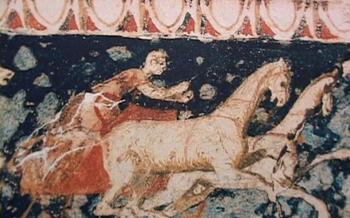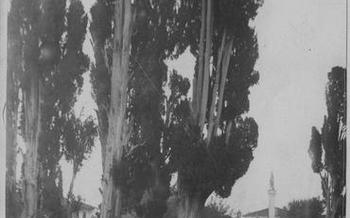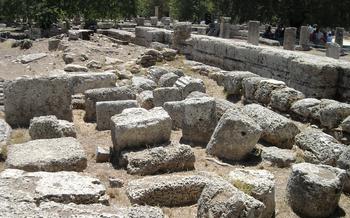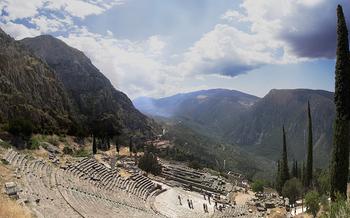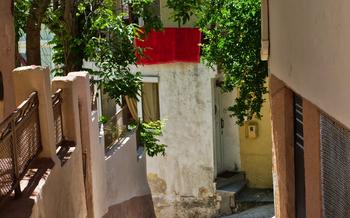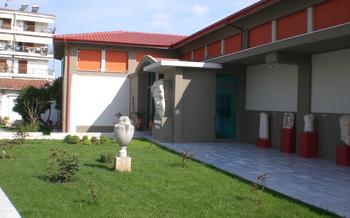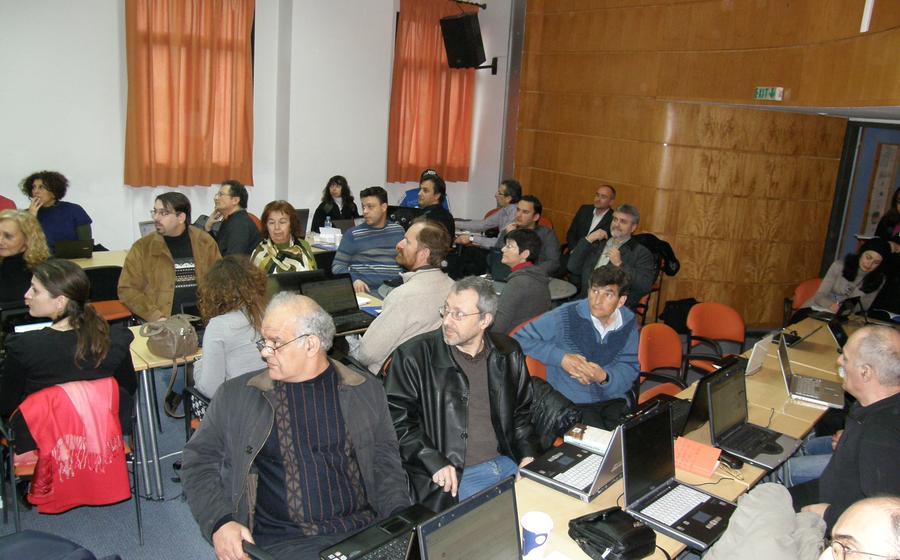
The Ancient Theatre of Mieza
- The Ancient Theatre of Mieza: A Timeless Legacy
- Unveiling the Past: A Journey Through History
- A Place of Learning and Entertainment
- Mesmerizing Architecture: A Symphony of Stone
- Echoes of Ancient Performances: Reviving the Past
- Exploring the Enchanting Surroundings
- A Haven for Theatre Enthusiasts
- Transportation and Accessibility
- Hours of Operation and Admission Fees
- Local Cuisine and Culinary Delights
- Accommodation Options for a Comfortable Stay
- Souvenirs and Local Crafts
- Preservation and Conservation Efforts
- Safety Tips for a Worry-Free Visit
- Insider Tip: Unveiling Hidden Gems
The Ancient Theatre of Mieza: A Timeless Legacy
In the heart of the picturesque region of Mieza, nestled amidst lush greenery and rolling hills, lies a testament to the enduring legacy of ancient Greek civilization – the Ancient Theatre of Mieza. This remarkably preserved theatre, dating back to the 4th century BC, offers a glimpse into the cultural and artistic heritage of Greece and serves as a reminder of the profound influence of Greek theatre on Western civilization.
The theatre's historical significance extends beyond its age. Constructed during the reign of Philip II, father of Alexander the Great, it served as a vital center for education and entertainment. Within its stone walls, young students honed their skills in oratory, rhetoric, and philosophy, while the community gathered to witness captivating performances of dramas, comedies, and musical spectacles.
The architectural features of the theatre are a testament to the ingenuity and craftsmanship of ancient Greek builders. Constructed entirely of local stone, the theatre boasts a well-preserved stage, an orchestra pit, and a seating area that could accommodate over 6,000 spectators. The meticulous attention to acoustics ensures that even today, the spoken word or a musical note can be heard clearly from every seat.
Beyond its historical and architectural significance, the Ancient Theatre of Mieza holds immense importance as an archaeological site. Ongoing excavations have unearthed a wealth of artifacts, including pottery shards, inscriptions, and sculptures, shedding light on the daily lives and cultural practices of the ancient Greeks. These discoveries have contributed significantly to our understanding of this remarkable civilization.
Unveiling the Past: A Journey Through History
The Ancient Theatre of Mieza stands as a testament to the rich history and cultural significance of ancient Greece. Its construction dates back to the 4th century BC, during the reign of Philip II, father of Alexander the Great. The theatre was part of a larger complex, the Mouseion, which served as a center for learning and education.
Philip II envisioned the Mouseion as a place where his son, Alexander, and other young nobles could receive a comprehensive education. The theatre played a crucial role in this educational program, hosting lectures, debates, and performances that covered a wide range of subjects, from philosophy and rhetoric to music and theatre.
Over the centuries, the theatre fell into disrepair and was eventually buried under layers of earth and vegetation. It was not until the late 19th century that archaeological excavations began to uncover the theatre's ruins, revealing its impressive size and architectural features.
Further excavations in the 20th century brought to light additional structures, including a gymnasium, a library, and a dining hall, confirming the Mouseion's role as a vibrant center of intellectual and cultural activity.
Today, the Ancient Theatre of Mieza stands as a testament to the educational and cultural legacy of ancient Greece. Its ruins offer a glimpse into the world of ancient Greek education and provide valuable insights into the development of theatre and performing arts in the region. Ongoing research and preservation efforts continue to shed light on the theatre's history and significance, ensuring its place as a valuable archaeological site and a source of inspiration for future generations.
A Place of Learning and Entertainment
The Ancient Theatre of Mieza served as a hub for both education and entertainment in ancient Greek society. It played a crucial role in the education of young Greek students, who attended performances as part of their curriculum. These performances exposed students to a wide range of subjects, including history, mythology, philosophy, and politics, fostering critical thinking and intellectual development.
The theatre also served as a venue for entertainment, providing a diverse array of performances that catered to a wide audience. Dramas, comedies, and musical performances took place on the stage, captivating audiences with their captivating storylines, talented actors, and beautiful music. These performances not only provided entertainment but also served as a form of social commentary, addressing contemporary issues and offering insights into the human condition.
The theatre's dual purpose as a place of learning and entertainment contributed significantly to the development of Greek theatre and performing arts. It provided a platform for playwrights, actors, and musicians to showcase their talents and hone their craft, leading to the flourishing of Greek theatre as one of the most influential forms of artistic expression in the ancient world.
Mesmerizing Architecture: A Symphony of Stone
The Ancient Theatre of Mieza stands as a testament to the architectural prowess of the ancient Greeks. Its imposing structure, carved into the natural slope of a hill, features a well-preserved orchestra, surrounded by tiers of stone seating that could accommodate up to 4,500 spectators. The stage, once adorned with intricate sculptures and decorations, provides a glimpse into the grandeur of ancient Greek theatre.
The theatre's seating arrangements reflect the social hierarchy of ancient Greek society. The front rows were reserved for honored guests and officials, while the upper rows were occupied by ordinary citizens. The acoustics of the theatre are remarkable, allowing even those seated in the highest rows to hear the actors' voices clearly. The panoramic views from the seating area, overlooking the lush Mieza valley and the distant mountains, add to the awe-inspiring experience of attending a performance in this ancient theatre.
Comparisons with other ancient Greek theatres reveal the unique characteristics of the Ancient Theatre of Mieza. While it may not be as large as the renowned theatres of Athens or Epidaurus, its intimate setting and exceptional acoustics create a unique and immersive experience for visitors. The theatre's well-preserved state and ongoing restoration efforts make it a valuable asset for understanding the architectural achievements of ancient Greece.
Echoes of Ancient Performances: Reviving the Past
The Ancient Theatre of Mieza not only stands as a testament to ancient Greek history and architecture but also serves as a vibrant venue for modern-day cultural events. Efforts are being made to recreate the atmosphere of ancient Greek theatre, allowing visitors to experience the magic and grandeur of performances that took place over two thousand years ago.
Modern-day theatre companies, both local and international, stage productions that range from ancient Greek classics to contemporary works inspired by the theatre's history. These performances aim to capture the essence of ancient Greek theatre, using traditional costumes, masks, and music to transport audiences back in time.
Reviving the theatre's original purpose as a place of entertainment and education, these performances offer a unique opportunity to witness the power of ancient Greek storytelling and witness the theatre's acoustics and stage design come to life.
However, preserving the theatre's authenticity while adapting it to modern needs presents challenges. Balancing the need for accessibility and safety with the desire to maintain the theatre's historical integrity requires careful planning and collaboration between theatre companies, archaeologists, and local authorities.
Despite these challenges, the efforts to revive ancient performances at the theatre have been met with great enthusiasm by both locals and visitors. These performances not only contribute to the preservation and promotion of ancient Greek culture but also revitalize the local community and attract tourism to the region.
Attending a performance at the Ancient Theatre of Mieza is an unforgettable experience that allows visitors to connect with the past and experience the magic of ancient Greek theatre in a truly immersive setting.
Exploring the Enchanting Surroundings
The Ancient Theatre of Mieza is nestled in the picturesque Mieza region, renowned for its natural beauty and historical significance. Beyond the theatre itself, visitors can embark on a journey of discovery, exploring nearby archaeological sites, historical attractions, and breathtaking landscapes.
Stroll through the charming village of Mieza, where time seems to stand still. Admire traditional Greek architecture, visit local shops and tavernas, and soak in the warm hospitality of the villagers.
Delve into the region's rich history at the Veria Archaeological Museum, housing an impressive collection of artifacts from the ancient city of Veria and the surrounding area. Discover the stories behind these relics and gain a deeper understanding of the region's past.
For nature lovers, the Mieza region offers an array of outdoor activities. Embark on a invigorating hike through the lush forests, marveling at the diverse flora and fauna. Follow scenic nature trails that lead to hidden waterfalls, serene lakes, and breathtaking viewpoints.
Combine your visit to the Ancient Theatre of Mieza with a trip to other nearby archaeological sites, such as the ancient city of Aigai, the birthplace of Alexander the Great, or the Vergina Royal Tombs, a UNESCO World Heritage Site.
Create a comprehensive itinerary that allows you to fully explore the Mieza region, immersing yourself in its natural beauty, rich history, and cultural heritage. Whether you're a history buff, a nature enthusiast, or simply seeking a unique and enriching experience, the Mieza region offers something for everyone.
A Haven for Theatre Enthusiasts
The Ancient Theatre of Mieza holds immense significance for researchers and scholars in the field of theatre and archaeology. It serves as a living laboratory for studying ancient Greek theatre practices, architecture, and performance techniques. Workshops, seminars, and educational programs are frequently organized at the theatre, providing opportunities for students, researchers, and theatre professionals to delve deeper into the world of ancient Greek drama.
International recognition and collaborations with theatre organizations from around the world have further enhanced the theatre's reputation as a center of excellence for theatre studies. These collaborations facilitate the exchange of knowledge, ideas, and best practices, contributing to the preservation and promotion of ancient Greek theatre heritage. The theatre also plays a vital role in promoting cultural exchange and understanding, fostering connections between people from different countries and backgrounds through the shared appreciation of theatre.
Transportation and Accessibility
Reaching the Ancient Theatre of Mieza is relatively straightforward. Public transportation options include buses and trains, with regular services connecting the theatre to the city of Veria and other nearby towns. Driving is also a convenient option, with well-maintained roads leading to the site. Ample parking facilities are available for visitors arriving by car.
To ensure a smooth visit, it's advisable to check the current transportation schedules in advance. Navigating the area is generally easy, with clear signage guiding visitors to the theatre. For those with disabilities, the site is wheelchair accessible, allowing everyone to enjoy the wonders of this ancient landmark.
Hours of Operation and Admission Fees
The Ancient Theatre of Mieza is open to visitors year-round, with varying hours of operation depending on the season. During the summer months (April to October), the theatre is typically open from 8:00 AM to 8:00 PM. In the winter months (November to March), the hours are usually from 8:00 AM to 3:00 PM.
Admission fees are charged for entry to the theatre and the surrounding archaeological site. The current ticket price for adults is 6 euros, while children and students can enjoy a discounted rate of 3 euros. Family tickets are also available, offering a discounted rate for two adults and two children.
Advance booking is recommended, especially during peak tourist season, to avoid long queues and secure your entry. Tickets can be purchased online through the official website of the Greek Ministry of Culture and Sports or at the ticket office located at the entrance of the theatre.
Please note that the hours of operation and admission fees may be subject to change, so it is advisable to check the official website or contact the theatre directly before your visit to confirm the most up-to-date information.
Local Cuisine and Culinary Delights
Indulge in the flavors of traditional Greek cuisine as you explore the Mieza region. From hearty stews to fresh seafood and delectable pastries, there's something to satisfy every palate. Don't miss the chance to sample local specialties like "kleftiko" (slow-cooked lamb), "spanakopita" (spinach and feta pie), and "gemista" (stuffed tomatoes and peppers).
For a memorable dining experience, visit one of the many tavernas and restaurants near the ancient theater. Enjoy al fresco meals with breathtaking views of the surrounding landscape. Vegetarian and vegan options are widely available, ensuring that everyone can savor the culinary delights of the region.
To truly immerse yourself in the local food culture, venture off the beaten path and explore the traditional markets and bakeries in the town of Veria. Discover hidden gems like homemade jams, honey, and artisan cheeses that will make for unique souvenirs or gifts.
Remember to support local artisans and farmers by purchasing their products. This not only ensures the preservation of traditional crafts and flavors but also contributes to the sustainable development of the region.
Accommodation Options for a Comfortable Stay
Whether you're seeking a luxurious retreat or a budget-friendly option, Mieza and the surrounding area offer a diverse range of accommodation to suit every traveler's needs. From charming guesthouses nestled amidst olive groves to modern hotels with panoramic views, there's something for everyone.
For those seeking proximity to the theater and other attractions, the town of Veria, just a short drive away, offers a variety of hotels and guesthouses within walking distance of the archaeological site. These accommodations often exude a traditional Greek charm, with whitewashed walls, terracotta roofs, and balconies adorned with colorful flowers.
For a more immersive experience, consider staying in a traditional village guesthouse, where you can enjoy authentic Greek hospitality and savor delicious homemade cuisine. These guesthouses often offer cozy rooms with rustic furnishings and stunning views of the surrounding countryside.
When selecting your accommodation, consider your budget, desired amenities, and preferred location. Whether you seek a tranquil retreat amidst nature or the convenience of being close to the theater, you'll find an array of options to ensure a comfortable and memorable stay in Mieza.
Souvenirs and Local Crafts
Unique Souvenirs and Locally Made Crafts to Take Home
The Ancient Theatre of Mieza and the town of Veria offer a treasure trove of unique souvenirs and locally made crafts for visitors to take home as mementos of their visit. From intricate pottery and handwoven textiles to traditional musical instruments and jewelry, there's something for every taste and budget.
Shopping Opportunities Near the Theatre and in the Town of Veria
Near the theatre, you'll find several small shops and stalls selling a variety of souvenirs, including replicas of ancient Greek coins, pottery, and sculptures. In the town of Veria, you'll find a wider selection of shops, including boutiques, art galleries, and traditional craft workshops.
Supporting Local Artisans and Preserving Traditional Crafts
By purchasing souvenirs and local crafts, you're not only taking home a piece of Greek culture but also supporting local artisans and preserving traditional crafts. Many of the craftspeople in the region have been practicing their skills for generations, and their work is a testament to the rich cultural heritage of Greece.
Recommendations for Finding Authentic and High-Quality Souvenirs
To find authentic and high-quality souvenirs, look for shops that sell locally made products and avoid mass-produced items. Ask the shop owners about the origin of their products and the artisans who made them. You can also visit the Veria Municipal Market, where you'll find a variety of local products, including fresh produce, cheese, honey, and olive oil.
Preservation and Conservation Efforts
The Ancient Theatre of Mieza, as a valuable archaeological site, requires ongoing preservation and conservation efforts to ensure its longevity. The theatre's structural integrity is constantly monitored, and necessary repairs and restoration projects are undertaken to address any damage caused by natural elements, wear and tear, or human activities. These efforts involve the use of traditional techniques and materials, ensuring that the theatre's authenticity and historical character are maintained.
One of the major challenges in preserving the theatre is balancing the need for conservation with the desire to make it accessible to visitors. While allowing public access to the site is essential for its appreciation and understanding, it also poses the risk of damage due to foot traffic and exposure to the elements. To address this challenge, designated pathways and viewing areas are created, and visitor numbers are carefully managed to minimize any potential impact on the theatre's structure.
Ongoing research and monitoring are also crucial for the theatre's preservation. Archaeologists and conservators regularly conduct surveys, excavations, and analyses to document and understand the theatre's history, materials, and condition. This information guides the development of appropriate conservation strategies and helps ensure that the theatre is preserved for future generations.
Visitors to the Ancient Theatre of Mieza have a role to play in its preservation. By respecting the site, following designated pathways, and refraining from touching or damaging any structures, they can contribute to its ongoing protection. The collective efforts of visitors, researchers, and conservationists help ensure that this ancient legacy remains a source of inspiration and knowledge for years to come.
Safety Tips for a Worry-Free Visit
The Ancient Theatre of Mieza is a safe and welcoming place to visit, but it's always essential to take precautions to ensure a worry-free experience. Here are some safety tips to keep in mind:
-
Wear comfortable shoes: The theatre is situated on a hill, and the paths leading to it can be uneven. Comfortable footwear will help you navigate the site safely and avoid any potential accidents.
-
Be mindful of your surroundings: Stay alert and aware of your surroundings, especially when climbing the steps to the seating area. Pay attention to any uneven surfaces or loose rocks to avoid tripping or falling.
-
Stay hydrated: The Mediterranean sun can be intense, especially during the summer months. Bring a bottle of water with you and stay hydrated throughout your visit to prevent dehydration.
-
Protect yourself from the sun: Wear sunscreen, sunglasses, and a hat to protect yourself from the sun's harmful UV rays.
-
Respect the site: The Ancient Theatre of Mieza is a valuable archaeological site, and it's crucial to treat it with respect. Refrain from climbing on the stage or touching the ancient ruins.
Insider Tip: Unveiling Hidden Gems
Beyond the Ancient Theatre of Mieza, the region holds a treasure trove of hidden gems waiting to be discovered. Venture off the beaten path to uncover lesser-known archaeological sites, such as the ancient city of Aegae, the birthplace of Alexander the Great. Explore the picturesque villages nestled amidst rolling hills, where time seems to stand still. Immerse yourself in local traditions by attending traditional festivals and events, where you can witness vibrant folk dances, savor delicious regional cuisine, and engage with the friendly locals. Don't miss the chance to interact with the warm and welcoming people of Mieza, who are always eager to share their stories, culture, and traditions. Strike up conversations, ask questions, and let their stories enrich your travel experience. Embrace the opportunity to connect with the local community and gain a deeper understanding of their way of life.
